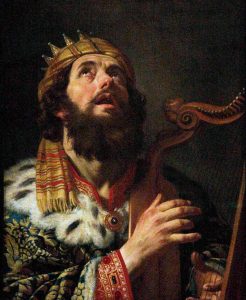HOMILY WEEK 03 01 – Year II
Letting Jesus Be Our King
(2 Sam 5:1-10; Ps 89; Mk 3:22-30)
************************************
“All the elders of Israel came to David at Hebron, and King David made a covenant with them.”
The readings today, by their stark contrast, invite us to be like the elders of Israel in the time of David who made him king, and recognize Jesus as our King and Lord of all creation.

King David
It is not clear if the liturgists who chose the readings for today had this as their intention, but the contrast between these readings could not be greater. The elders of Israel remind David of their relationship with him, how God has worked in his life, made a covenant with him and anointed him their king. They then marched with him to conquer the stronghold of Zion, that part of the old city in Jerusalem that to this day is called the City of David.
What a contrast to how Jesus is treated in the gospel! The scribes from Jerusalem accuse him of having a devil, and being in collusion with the devil. The charges by the Jerusalem scribes are serious: he is possessed, and Satan is working through him. Jesus is thus not only breaking the law and blaspheming, but in their minds is a tool of Satan.
Jesus refutes the charge by pointing out that the full implications of the charge (breaking up of Satan’s kingdom) are non-existent. On the other hand, the exorcisms of Jesus show that he has broken into the stronghold of Satan and rescued the captives. Satan is the Strong Man, and Jesus is the Stronger Man armed with the power of God.
The unforgivable sin is humanity’s refusal of salvation made present by the Spirit-filled activity of Jesus. By saying that Jesus was demonic, the scribes were refusing to admit that the kingdom of God had come in his person and presence, thus putting themselves outside of the kingdom. Blasphemy against the Holy Spirit is a perversion of the mind which chooses to call darkness, light. The universality of forgiveness means genuine repentance can always win God’s forgiveness. But their blasphemy excludes any openness to repentance and thus excludes any possible openness to forgiveness.
The will of the Father is the motive and guide for all Jesus’ ministry. Those who do his will enter into a real relationship with Jesus; they belong to the family of God. Those outside do not recognize that his ministry was the work of God. Those who do believe in hm, gather about him in his school, in fellowship and become his kinfolk.
This section contains two episodes, one embedded within the other, a common technique of Markan composition. Jesus’ relatives fear that he has lost his mind. Meanwhile, enemies among the scribes accuse him with a formal legal charge that he exercises satanic powers. Since persons charged with doing magic could be either banished or executed, such suspicions could not be left unchecked. Once Jesus has responded to the scribes, readers now know that all his activity is motivated by the Holy Spirit.
Mark frequently alternates between inside and outside, between those around Jesus and the crowds. Opponents are always outside. Those who charge Jesus with being in league with Satan are outsiders, because they have rejected what comes from God.
The New International Bible teaches that as a rhetorical device, proverbial sayings turn the tables against the opponent by showing that any intelligent person would recognize the absurdity of the opponent’s view. Parables and proverbial sayings form a central element in the teaching of Jesus. Proverbs, riddles, and illustrative stories are fundamental to oral cultures. The actions of Jesus demonstrate, once again, that demonic powers are being broken up. Jesus is stronger than Satan and is able to bind Satan and raid his kingdom. Properly understood, Jesus’ exorcisms are evidence that God’s rule is becoming present in Jesus’ ministry.
Psalm 89 lines up nicely with what the elders were saying of David and his relationship with God: “My faithfulness and steadfast love shall be with him … with my holy oil I have anointed him … my hand shall always be with him,” etc. And now, in faith, we know that psalm reaches its fulfilment in Jesus Christ, the anointed one, the Messiah of God. Would that the scribes and religious leaders of Israel at the time of Christ have been able to grasp that same understanding.
The first time I was in Jerusalem as part of the Tantur Ecumenical Institute, our guide took us to the City of David where the Jewish leaders of today are excavating that area, eagerly looking for any evidence they can find to link their presence there with the long-ago reign of King David to bolster their claim to Jerusalem. It was great comfort to us knowing we did not need any historical evidence to link our presence there to Jesus, the king of kings. Our faith in him was more than enough for us.
The Eucharist is a historical continuation flowing from the Last Supper Jesus celebrated with his apostles, perhaps not far from where we were standing as we surveyed the historical city of David.
May our celebration today deepen our faith in Jesus as Son of David, Son of God, King of the world and Lord of all creation.



